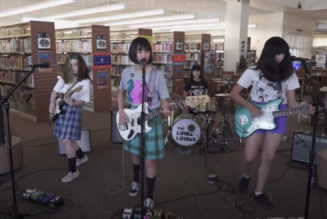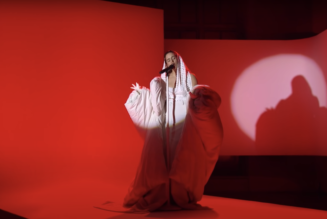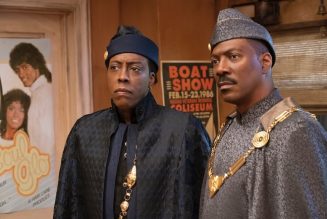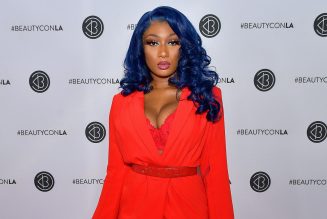
Vibe editor-in-chief Datwon Thomas and formerly incarcerated teacher and Writing My Wrongs author Shaka Senghor co-moderated the “Facing the Music: The Fight for Criminal Justice Reform in America” panel Wednesday (July 1). The two discussed how artists can amplify police reform legislation with their voices in a 40-minute conversation with Grammy-nominated artist Aloe Blacc, U.S. Congressman for the Eight District of New York Hakeem Jeffries, trial attorney Justin Moore, and formerly incarcerated Lava Records and “Wrongful Conviction” podcast founder Jason Flom.
“Music has been such an integral part of social impact work and civil rights movements,” Senghor said while asking Jeffries how musicians can better leverage the cultural impact of the industry for bipartisan legislative efforts.
Jeffries helped pass the George Floyd Justice in Policing Act last Thursday, June 25, which he noted as “the most progressive police reform bill ever to pass any House of Congress.” The comprehensive bill holds law enforcement officials accountable for their actions such as banning chokeholds and “no-knock” warrants, classifying lynching as a hate crime, collecting data on police encounters and more. He said the bill classified as H.R. 7120 received “overwhelming Democratic support as well as some Republican support” while stating how the music community could also be a part of the push.
“Bringing together within the music space, using your cultural influence, your voice and your power to elevate the public sentiment that something needs to happen will be incredibly important,” Jeffries responded to Senghor.
On behalf of the music community, Blacc used his voice to speak on the changes he wants to see most within police reform at the federal level — eliminating qualified immunity. This Supreme Court doctrine “shields government officials from being held personally liable for constitutional violations — like the right to be free from excessive police force — for money damages under federal law so long as the officials did not violate ‘clearly established’ law,” which H.R. 7120 seeks to end.
But Moore, who also serves on the board of the Dallas Institute of Humanities and Culture and Achieve Inspire Motivate program, took the qualified immunity conversation with artists and citizens alike a step further. “If we want wide scale change in reform, we gotta include prisoners,” he said. “I would like the House to take it a bit further and say, ‘You know what? Prisoners are experiencing constitutional violations also, but there’s also a safeguard or a preventative measure that prevents them from getting in a court, which is the Prison Litigation Reform Act.’ So even if we do do away with qualified and sovereign immunity, it’s still going to be tough for prisoners to lodge their complaints in court against the officers or correction officers who violate their civil rights.”
Jeffries told Moore that he’s “absolutely committed to ending qualified immunity for prison guards” but decided not to include the notion in the most recent bill because “there are some broader issues that we’re going to have to deal with on the prison reform side of the equation.” The U.S. Congressman mentioned private prison constructions, mandatory minimum sentencing, the ongoing war on drugs since the ‘70s, and other factors fitting under the umbrella of the prison industrial complex he believes should be abolished.
Senghor, who served a 19-year prison sentence for second-degree murder, spoke to his firsthand experience of how prisons serve as “the testing grounds for how much abuse you can get away with because they’re very clandestine.” He sees the fear-mongering marketing on the war on drugs that dehumanized and criminalized Black Americans as a pipeline for such abuse and suppression. After listening to the rest of those on the panel, Blacc spoke up and said it’s up to artists and Hollywood elites like himself to also apply pressure on Capitol Hill for these reformative measures to be passed.
“There’s a method, there’s a system, there’s a history around how politics is done on the Hill. I’m hoping that with the movement that’s happening right now on the streets with the activists, that’s happening in the industry with musicians, actors and athletes, that we can push Capitol Hill to act for the will of the people and not just conduct business as usual,” “The Man” singer said. “It’s incumbent upon us as artists to take advantage of our platform to either write the song, to write the op-ed, to make the social media post that says, ‘This is what the action item is.’”
Flom recognized earlier that artists have historically taken up their mics to serve a larger purpose that deters from the industry standard of personal presentation and promotion, a move constantly being made in the recording studios and on social media platforms. “Social movements have been driven by music over time,” he said. He used Crosby, Stills, Nash & Young as a prime example when the group recorded “that iconic, incredible, legendary song ‘Ohio’” following the 1970 shooting at Kent State University when four students died and nine were injured during campus protests regarding the Vietnam War.
[embedded content]
“We’re in a moment now where we’re starting to see artists, especially the younger artists. If you saw the video that H.E.R. put out the other day, that was so incredible….” Flom said. “At a minimum, we need our artist community to come together and be vocal and ideally release music that speaks to this topic and videos that speak to this topic. Because we cannot let this fade. This feels like, this is an overused phrase, but it really feels like a tipping point, and we have to change it.”
[embedded content]
Toward the end, Senghor asked each member of the panel to list which musicians they’re listening to right now to get them through because “times are hard and I think self-care is an act of revolution.” His playlist picks include Curtis Mayfield and Marvin Gaye, while Moore has Boosie, Jay-Z, Johnnie Taylor and more personally fundamental artists on a rotation that allow him to “get back to this childlike existence to where I’m not carrying the weight of the world on my shoulders.” Blacc has Gene McDaniels’ Headless Heroes of the Apocalypse, Gaye’s What’s Going On and more seminal albums on shuffle that the White House shut down at the time of their releases.
Flom said he’s been rocking out to Sly & the Family Stone and his new artist Leo The Kind, but he hailed The Chicks (formerly known as The Dixie Chicks) for always “walking the walk” when it comes to standing up and speaking out on the group’s platform. Jeffries uses a combination of inspirational gospel tunes and 1990s hip-hop classics (Nas, The Notorious B.I.G., Jay-Z) to get him through his work on the Hill.
Watch the entire “Facing the Music: The Fight for Criminal Justice Reform in America” panel discussion below.








